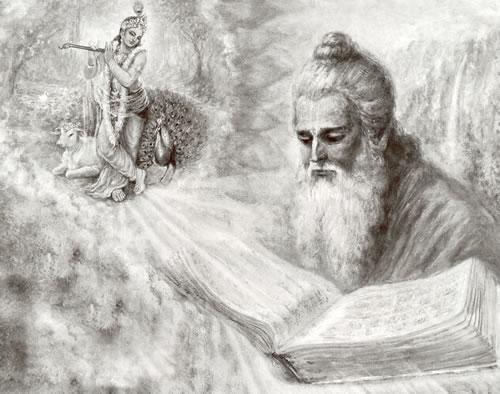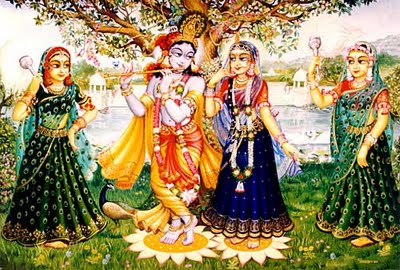|
|
 Q&As: Was Srila Prabhupada conditioned? [part two]
Q&As: Was Srila Prabhupada conditioned? [part two] Here’s the second part of the question regarding Srila Prabhupada’s alleged projection of personal sexual frustration into his presentation of Krsna consciousness:
Question:
Here is the phrase in question, corresponding to SB 10.58.17-19. The troublesome words are two, “raised breasts” [which are not in the original Sanskrit]. We would be very much pleased to hear your expert opinion in regard to this matter.
Quote from Krsna book, chapter 58: “Five Queens Married by Krsna”
“While resting and drinking water, they saw a beautiful girl of marriageable age walking alone on the bank of the Yamuna. Krsna asked His friend Arjuna to go forward and ask the girl who she was. By the order of Krsna, Arjuna immediately approached the girl, who was very beautiful. She had an attractive body, nice, glittering teeth and a smiling face. Arjuna inquired, “My dear girl, you are so beautiful with your raised breasts. May I ask you who you are? We are surprised to see you loitering here alone. What is your purpose in coming here? We can guess only that you are searching after a suitable husband. If you don’t mind, you can disclose your purpose. I shall try to satisfy you.”
Answer:
This reply is a little lengthy but it is necessary in order to establish the proper perspective on this question. This is a serious issue and I humbly request you to please give this a serious read.
In giving this description in his summary study ‘Krsna’ Srila Prabhupada is simply following the lead of Srila Vyasadeva, the author of the Srimad Bhagavatam.

In the SB there are many places where the beauty of a woman includes a description of her breasts. They are mentioned specifically as being “raised” “projecting upwards” etc. I will give some examples of this later in this text.
What to speak of material women, there are specific descriptions of Krsna’s queens, or the Gopis intimately playing with Krsna, which also mention that a component of their spiritual beauty is their attractive breasts, which are sometimes compared to cakravaka birds.
Consequently, when Srila Prabhupada includes the phrase “raised breasts” in his summary study of the 10th Canto description of the meeting between Krishna, Arjuna and Kalindi, Srila Prabhupada’s addition of this phrase is not at all material, nor is it a product of his lust, frustration, attraction to the forms of material women etc. It is a factual parampara expression of the transcendental beauty of one of Lord Krsna’s eternal and most intimate devotees, His wife Kalindi. Even though it is not directly in the text, it is still a fact and Srila Prabhupada’s addition of it is perfectly spiritual.
Kalindi is part of the internal energy of the Lord. She is a direct expansion of Radharani.

She is the Yamuna personified and one of the eight principle queens of Lord Krishna. As such there is no material aspect to her beauty. As Srila Prabhupada writes in the SB 1st Canto:
SB 1.11.31
“Unbelievers become astonished to learn that Lord Krsna married more than 16,000 queens because they think of Lord Krsna as one of them and measure the potency of the Lord by their own limited potency. One should know, therefore, that the Lord is never on the level of the living beings, who are but expansions of His marginal potency, and one should never equalize the potent and the potency, although there is very little difference of quality between the potent and the potency. The queens were also expansions of His internal potency, and thus the potent and potencies are perpetually exchanging transcendental pleasures, known as pastimes of the Lord.”
And again, according to Srila Visvanatha Cakravarti Thakura,

as quoted by Hridayananda Maharaja in his purport of SB 10.83.40:
“In the opinion of Srila Visvanatha Cakravarti, Srimati Laksmana became embarrassed when she realized that she had been talking about herself, and so she spoke this verse praising her co-wives. In her humility Laksmana claimed that Krsna’s queens, unlike ordinary wives, could not bring their husband under control, and thus they could relate to Him only as servile housekeepers. In fact, however, since the Lord’s queens are direct expansions of His internal pleasure potency (hladini-sakti), they fully controlled Him with their love.”
Srila Jiva Goswami in his Krsna-sandarbha, describes the queens of Krsna as expansions of His internal potency, and Srila Sukadeva Goswami, at the end of his narration of Narada Muni’s visits to the palaces of the queens of Dvaraka, says,
“Lord Hari is the ultimate cause of universal creation, maintenance and destruction. My dear King, anyone who chants about, hears about or simply appreciates the extraordinary activities He performed in this world, which are impossible to imitate, will surely develop devotion for the Supreme Lord, the bestower of liberation.”
Srila Prabhupada summarizes this verse in the Krsna book by saying:
“In narrating the activities of Lord Krsna in Dvaraka, Sukadeva Gosvami explained to King Pariksit how Lord Krsna, the Supreme Personality of Godhead, descends to this material universe by the agency of His internal potency and personally exhibits the principles which, if followed, can lead one to achieve the ultimate goal of life. All the queens in Dvaraka, more than sixteen thousand in number, engaged their feminine attractive features in the transcendental service of the Lord by smiling and serving, and the Lord was pleased to behave with them exactly like a perfect husband enjoying household life. One should know definitely that such pastimes cannot be performed by anyone but Lord Sri Krsna, who is the original cause of the creation, maintenance and dissolution of the whole cosmic manifestation. Anyone who attentively hears the narrations of the Lord’s pastimes in Dvaraka or supports a preacher of the Krsna consciousness movement will certainly find it very easy to traverse the path of liberation and taste the nectar of the lotus feet of Lord Krsna. And thus he will be engaged in Lord Krsna’s devotional service.”
Therefore if Srila Prabhupada, as a pure devotee, includes an additional description of Kalindi’s beauty, there is no wrong in that, it is rather an aspect of his service and glorification of the Lord and His internal devotees. It is meant to show us that the great devotees of the Lord please Him by their personal beauty and service attitude which is all offered for His pleasure.
Now I shall give some examples where Srila Vyasadeva has included in the SB some descriptions of the breasts of women. In reading this you can just reflect on whether Vyasadeva was doing this because of his own frustrated sex life, or because there is some transcendental purpose.
 India and the money crisis: knowledge is the solution
India and the money crisis: knowledge is the solution October 1 2008
“How much money does a man need in order to be happy?”
“Just a little more!” — Nelson Rockefeller
Nowadays the Indian economic ‘miracle’ is all the rage. Just this year alone entrepreneurs are building over 100 new malls in the major cities around the country. A few days ago the newspapers reported that India is making more new millionaires per year than any other country in the world. India is in a get-more-money fever it has never witnessed before. Lust for money is spreading like meningitis in the minds of India’s citizens and the government is proud of touting its new found wealth and opportunities and its consumer society.
Like the legendary lemmings, its populace is being urged to pursue a suicidal course — literally.
It is now witnessing its first financial suicides:
Kolkata Telegraph: The stock market crash claimed its first victims when Abhishek Banka, a sub-broker, committed suicide and, unable to bear the loss, his wife Sona threw herself from a highrise.
The bloated body of 22-year-old Abhishek, missing since Wednesday, was today found floating along the bank of the Hooghly.
Six hours later, Sona jumped to her death from her parents’ ninth floor apartment on Russel Street.
Police said Abhishek appeared to have been driven to suicide after suffering losses of Rs 86 lakh in the stock market collapse since the budget. They said the sub-broker with Suresh Kumar Fogla & Associates blamed himself for the losses.” -[end quote]
And on the land, scores of farmers kill themselves every week. Unable to cope with the changes in the markets they have no control over, many get into overwhelming debt and the meagre earnings from cash crops fails to cover their repayments.
Kolkata Telegraph:
Kadegaon/Tasgaon (Sangli in western Maharashtra), Jan. 30: The scourge of traditional agriculture has spread to new-age crops with at least 86 debt-hit grape farmers killing themselves in Sangli and Solapur districts of western Maharashtra since January 2005.
In Sangli district, 400km from Mumbai, there have been 61 cases of suicide by farmers growing table grapes, a capital-intensive fruit, since 2003.
The suicides were not triggered by one failed crop: they were a result of five years of crop failure; unscrupulous middlemen who have kept the purchase price static at Rs 10 per kg; a prolonged period of rising input costs; and unremunerative prices for the produce.” [end quote]
Monetary despair is not just happening in the countryside either:
Kolkata Telegraph: Aasra, a Mumbai-based suicide prevention NGO, claims to have recorded a 30 per cent increase in 10 years in the number of people who call because they are in a monetary mess and are contemplating suicide. Most of these people are young, ambitious, high spending and impatient to get rich, says Johnson Thomas, director, Aasra. “As the avenues for spending increase, most young Indians have started living beyond their means. This leads to debt, depression and suicide,” says Thomas. [end quote]
Srila Prabhupada was never enamoured by ‘economic advancement’. He always told us it was an illusion that would end in distress.
In December 1975 Prabhupada was visiting Sananda in Gujarat. On his first morning there he took a walk through the fields in the local district:
